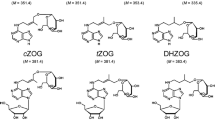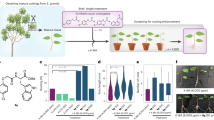Abstract
IN a recent paper, Galston1 has shown that βindoleacetic acid, at concentrations of 1–10 p.p.m., inhibits the growth in the dark of excised stem tips of Asparagus, in contrast to its normal stimulating effect in the light. Nicotinic acid, at a concentration of 0.5 p.p.m., was shown greatly to augment this dark inhibition, although without any effect by itself. These results were regarded as indicating that nicotinic acid is involved in the growth-regulating action of β-indoleacetic acid.
This is a preview of subscription content, access via your institution
Access options
Subscribe to this journal
Receive 51 print issues and online access
$199.00 per year
only $3.90 per issue
Buy this article
- Purchase on Springer Link
- Instant access to full article PDF
Prices may be subject to local taxes which are calculated during checkout
Similar content being viewed by others
References
Galston, A. W., J. Biol. Chem., 169, (2), 465 (1947).
Audus, L. J., and Quastel, J. H., Ann. Bot., N.S., 12, (45), 27 (1948).
Author information
Authors and Affiliations
Rights and permissions
About this article
Cite this article
AUDUS, L. Nicotinic Acid and the Inhibition of Growth by Auxin. Nature 162, 811–812 (1948). https://doi.org/10.1038/162811b0
Issue Date:
DOI: https://doi.org/10.1038/162811b0
This article is cited by
-
Das Hemmstoff-Wuchsstoffsystem des Maisskutellums
Planta (1951)
Comments
By submitting a comment you agree to abide by our Terms and Community Guidelines. If you find something abusive or that does not comply with our terms or guidelines please flag it as inappropriate.



